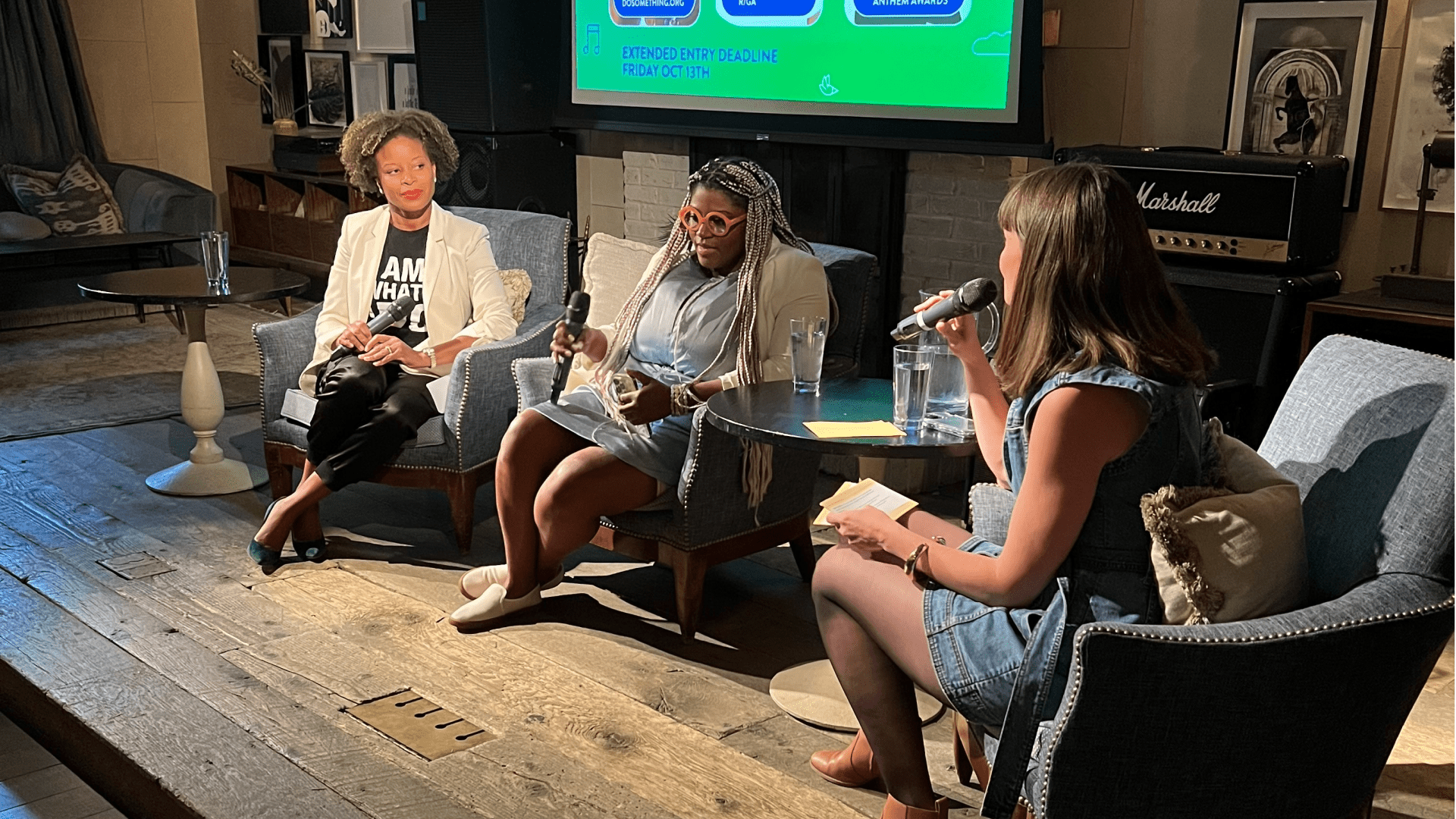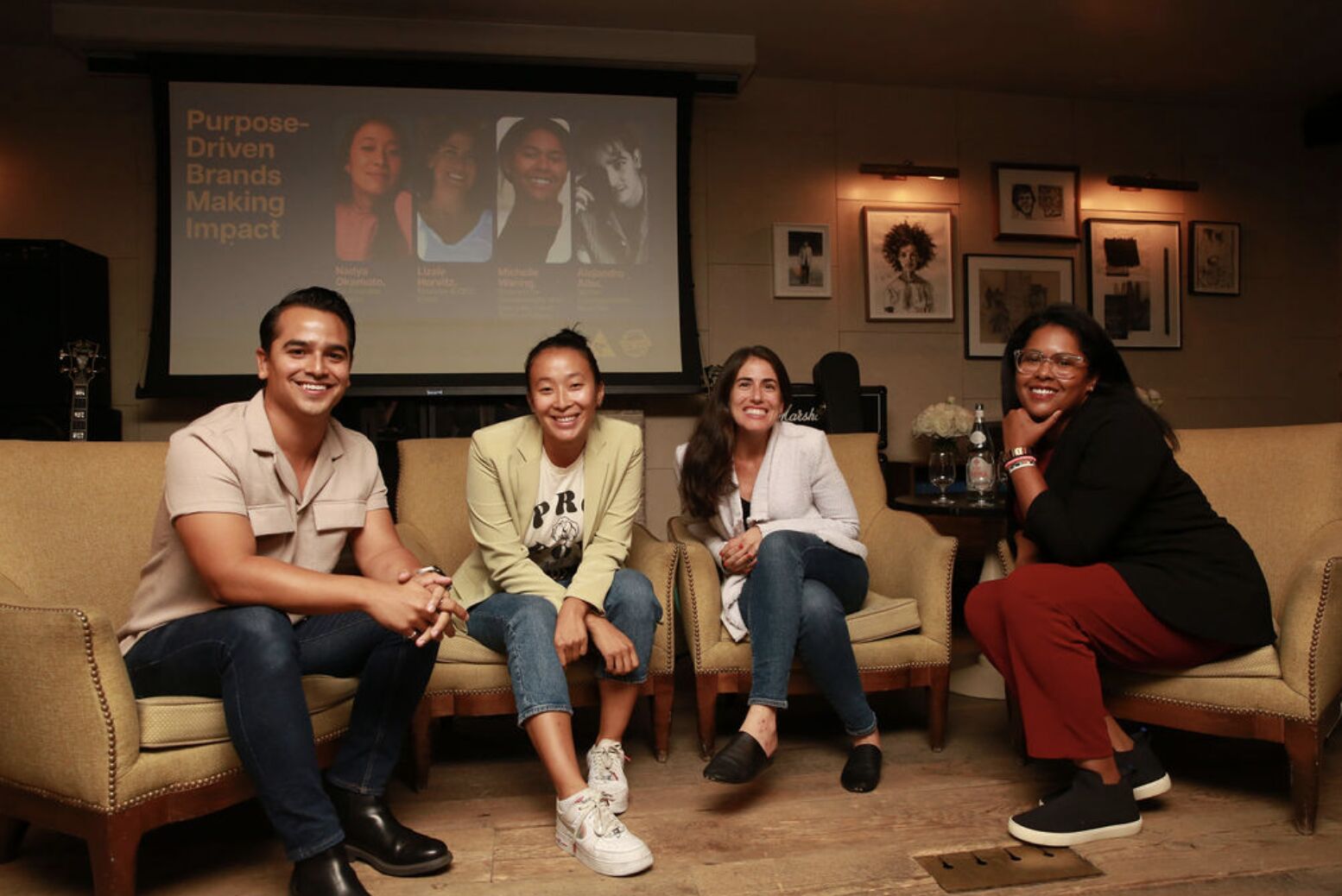ICYMI—Change is a Chain Reaction: Business with Purpose
A recap of the themes explored in The Anthem Awards’ panel on how businesses can leverage their resources to create impact and ignite change.

We’ve reached a unique point in social impact in 2023. Amid socioeconomic and environmental shifts, purpose-driven work has become crucial. Brands have the power to set a new precedent for better business models when harnessing their platforms for good, driving other companies to do the same. But what does it take to balance impact with profitability?
To find out, The Anthem Awards hosted the panel discussion and networking event, Change is a Chain Reaction: Business with Purpose, at Neuehouse in New York City in late July. The panel featured key impact leaders Megan O’Sullivan, Manager of Brand Marketing at Cuyana, and Emily Barfoot, Anthem Judge and Global Director Dove Skincare at Unilever, in a thoughtful discussion moderated by Claire Graves, President of The Anthem Awards.
As the 3rd Annual Anthem Awards is a celebration of the intersectionality of impact, we’ve convened our community of advocates to explore ways corporate and nonprofit initiatives can work collectively to ignite global change.
ICYMI – Here are a couple of insights on how businesses and brands can inspire change.
1. Mold Purpose into Business Models
Social impact is expansive; there’s room for both small and big brands, nonprofits and for-profits, and grassroots and global organizations to make an impact. There’s a growing space for purpose and impact for it in the corporate sphere.
“It is being done every day by people on the ground, but it also has to be done by people who work for companies like I do,” said Barfoot.
Social impact should fit organically in your business model—from supply chain to production, to investment strategies and engagement tactics. Tying it naturally with your overall business initiatives is a strategic way of balancing profitability with social responsibility.
O’Sullivan explained, “If you really are a company that started with that and it’s part of the fabric, it’s not just an arm, your customers will reward you by keeping you alive.”
Cuyana is distinctly known for its “fewer, better” model; its business structure is founded on producing to meet demand, not surpass it. By being mindful of overproduction, Cuyana stands as an authentically sustainable brand using its voice to advocate for change.
“I think there’s a place for large companies, and there’s a place for small companies,” said O’Sullivan. “I think a form of investing in social impact is not taking up more space than you need to take up because we already have enough stuff.”
Making impact as a business can mean reimagining the structure with a socially and environmentally responsible lens. This strategy can also be essential to defining just how evergreen your brand is. Creating products to last a long time pushes you only to make what you can sell—ensuring profitability without compromising your impact.
Thinking about it operationally also ensures that you can be held accountable. It’s important that you avoid greenwashing or making claims that you’re not ready to follow up on.
“The big risk that you get called out on is not walking the talk,” said Barfoot. “That’s where you never say anything without an action behind it. We don’t talk about things that we’re not doing something about, in any way, small or large.”

Emily Barfoot (left), Megan O'Sullivan (middle), and Claire Graves (right) convene with the Anthem community.
2. Be Authentic, Purposeful, and Intentional
Intention is key in social impact. The right cause has to drive your initiatives—one that ties organically with your brand’s values.
If your cause or initiative isn’t in harmony with the foundation of your brand, the work won’t be thoughtful. The cause you advocate for or the nonprofit you collaborate with has to be aligned with your company’s core mission.
“Walking the walk in terms of, when there’s an opportunity to invest in an organization, be consistent,” said O’Sullivan. “Those decisions really reflect the values that you say you have. Making decisions that give back to organizations or people in a way that reflects those values is super important.”
To remain authentic, find the right cause that fits your brand identity. The Self-Esteem Project is a global campaign that Dove initiated to help young people build self-esteem and confidence. It’s a campaign that aligns with their mission to make beauty accessible and a source of confidence, not anxiety. Engage with a cause that connects to your brand’s mission to dispell the myth that business and impact are at odds.
“I think that argument is fundamentally flawed,” said Barfoot, giving insight into what drove the global brand to create the campaign. “Because it’s a matter of finding the right purpose in order to lead that authentically with your business.”

Barfoot and O'Sullivan answer audience questions.
3. Understanding Your Consumer is Key to Your Impact Initiatives
Connecting with your consumers will help you tailor your impact initiatives to your brand’s unique context. From starting a Close Friends on Instagram to hosting intimate events for their most loyal customers, Cuyana’s social listening has heavily directed their approach to social responsibility.
“We want to just talk to her, if she’s open to it,” said O’Sullivan on how they engage with their community by imagining the persona of their core customers. “And understand, ‘What are you going through? And what do you need in your day-to-day life that we can help make your day better?”
This approach helped Cuyana establish a production level proportional to their consumer demand—they sell through 90% of their inventory, despite the industry average being 60-70%.
Understanding the value your business can bring to consumers is another essential element. As Dove’s goal is to provide the best care to families, Baby Dove launched the campaign #OneRealPressure to raise awareness of postpartum mental health and the challenges of early motherhood.
“It started with a really robust understanding of the landscape of postpartum mental health—of what’s happening now, who are the players, and what are the issues,” explained Barfoot. “It started with understanding the landscape. It also started with identifying a universal consumer insight that not only the current consumer, but future consumers will likely resonate with.”
Listen to the challenges your audience is facing and the values they’re seeking from your brand to highlight the issues your initiative can address. Fostering a close relationship with your audience is vital to creating meaningful impact work.
To join the Anthem community of transformative and leading impact experts, enter the 3rd Annual Anthem Awards by the Extended Entry Deadline on Friday, October 13!








